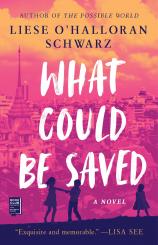Reading Group Guide
Discussion Questions
What Could Be Saved

1. Sisters Beatrice and Laura react very differently to the news that their long-lost brother may have been found. Why do you think that is? What are the roots of the strain between the sisters? Do you relate more to Beatrice or to Laura?
2. In the beginning of the book, Laura has been experiencing an artistic block, unable to move on from a series of paintings called the “Ghost Pictures.” Who or what do you think the ghosts might represent?
3. Genevieve undergoes a striking transformation over the course of the book. As a young wife and mother in Bangkok, what were her primary motivations and concerns? In the second half of her life, how did those change? Do you think she became a fundamentally different person, or did she merely channel her energy into different causes? Did you find it strange that she devoted so much time to rescuing other people’s children while paying so little attention to her own?
4. Water is a recurring theme in the book --- the khlongs, the swimming pool in the Prestons’ garden, the river that runs past Noi’s house. Do you think water represents the same thing each time it appears?
5. In chapter eight, Bardin tells Robert a story about an elderly woman who mysteriously dies in the middle of the night. Why do you think Bardin tells him this puzzling story? And why does it come back into Robert’s mind just as he’s facing his own mortality?
6. The Preston family’s house servant Noi notes on page 370 that “although [she] was not much older than the Preston daughters, she had always felt the gap keenly.” What made Noi grow up faster than Beatrice and Laura did? What role did Noi play in the lives of the Preston family? Did her role change over time?
7. Genevieve tells Beatrice on page 382, “You don’t have to do the same things I do,” and Beatrice says, “I know.” How do you think Beatrice’s choices, as she grows up, are different from her mother’s? How are they similar?
8. “We’re all still children…That never stops” is said by a character in the book (p. 235). Do you agree with that statement?
9. On page 399, Bea says to Laura, “you were what could be saved of our family.” Bea could be speaking literally --- their conversation is about measures Bea took to save her sister from a potential kidnapper. What else could Beatrice have meant by that statement?
10. At the annual luncheon to welcome “New Ladies” to the expatriate community, Genevieve is astonished that one of the newcomers is a man. What does this suggest about the ways American society is changing while she is in Bangkok? What else does she notice about the “New Ladies” that disturbs her?
11. When the Preston family returned to the U.S., they brought one of their servants, Noi. In the book we read about Noi’s dreams, her love for her sister, her skills as a seamstress, her desire for a daughter. In bringing her back to America, did the Prestons help Noi fulfill an “American Dream”? Why or why not?
12. Philip is given a nickname by his martial-arts classmates: Nitnoy. At first he rejects it, but later on he embraces it. Why do you think he does that?
13. Compare Robert’s final moments of consciousness (p. 363) to Genevieve’s experience of dementia. Do they share certain qualities? How does Genevieve’s dementia allow her a freedom she never had in her former life? What has her illness taken away from her, and what has it given to her?
14. On page 327, Laura makes a point of replaying in her mind the scene of the car being lifted out of the pool, “so she could describe it perfectly for Philip when he came home…. She memorized it so carefully…but then as the years went on she slowly forgot it all.” What does this suggest about the reliability of Laura’s memories of her own childhood? Do you think it’s possible for any of us to be able to recall our childhoods with accuracy? What is your earliest childhood memory? Can the stories we tell ourselves replace our actual memories?
What Could Be Saved
- Publication Date: August 31, 2021
- Genres: Fiction, Women's Fiction
- Paperback: 480 pages
- Publisher: Washington Square Press
- ISBN-10: 1982150629
- ISBN-13: 9781982150624







